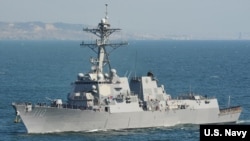China sent fighter jets into the air on Tuesday after a U.S. Navy ship sailed close to a disputed area in the South China Sea.
The U.S. Defense Department said the USS William P. Lawrence, a guided missile destroyer, traveled within 22 kilometers of Chinese-occupied Fiery Cross Reef.
A Defense Department official said the Navy carried out the operation to “challenge excessive maritime claims” by China, Taiwan and Vietnam. He accused them of seeking to restrict the movement of shipping and aircraft in the area.
China’s Defense Ministry said two fighter jets and three warships followed the U.S. ship, telling it to leave.
Chinese officials denounced the U.S. action as an illegal threat to peace. They said it showed China’s defensive positions in the area were necessary.
China claims most of the South China Sea. Brunei, Malaysia, the Philippines, Taiwan and Vietnam also have claims to parts of the waterway.
U.S. Considering Arms Sales to Vietnam
Tensions over the competing claims are expected to be discussed when U.S. President Barack Obama visits Vietnam later this month. His administration is currently re-examining the U.S. ban on arms shipments to the country.
The arms embargo has been in effect for over 30 years. In 2014, the U.S. partially eased the embargo to enable shipments of materials only relating to maritime security.
Now, the Obama administration is considering a total lifting of the arms ban as a sign of trust and developing ties between the two countries.
Vietnam has long sought a complete removal of the ban. Such a step would signal a historic move away from a remaining remnant of Vietnam War era hostility.
The United States reestablished full diplomatic relations with Vietnam in 1995.
The current ban on non-maritime lethal weapons shipments to Vietnam “can be modified to reflect changing circumstances,” according to U.S. official David McKeeby. He is a spokesman for the State Department’s Bureau of Political-Military Affairs.
McKeeby told VOA that administration officials will closely consult with Congress on any proposed changes. He also said Vietnam’s human rights record will be an “essential element” when making any policy decision.
U.S. and Vietnamese officials are meeting this week to prepare for Obama’s visit. The State Department said the U.S. officials are noting that Vietnam should make progress on human rights if it wants to improve ties.
The department cited progress made by the Vietnamese government in some of its human rights practices. But it also pointed out violations and abuses, including political restrictions and arbitrary arrests and detentions.
Murray Hiebert is a Vietnam expert with the Center for Strategic and International Studies (CSIS). There is currently “quite a bit of discussion” happening between the two sides, he said.
Hiebert added that Vietnam is cooperating with the United States on issues such as maritime security “in the context of China’s increasing assertiveness in the South China Sea.”
But even if the arms embargo is lifted, Hiebert said, this does not mean Vietnam will actually be permitted to buy specific items. The United States could still reject individual arms transfer requests if there are serious human rights violations, he said.
One Vietnamese official recently predicted there would be “favorable conditions” in the coming years that “should allow the countries to increase defense cooperation.”
The comments by the Deputy Director of Vietnam’s Ministry of Foreign Affairs, Lai Thai Binh, were published in a report for the CSIS Pacific Forum. He added that Washington and Hanoi currently share “strategic interests in handling the South China Sea.”
I’m Bryan Lynn.
Nike Chang reported this story for VOANews.com. Bryan Lynn adapted her report for Learning English. George Grow was the editor.
We want to hear from you. Write to us in the Comments Section, and post on our Facebook page.
________________________________________________________________
Words in This Story
embargo – n. an official ban on trade with a particular country
maritime – adj. relating to the sea, especially relating to commercial or military activity
remnant – n. a small remaining amount of something when other parts are gone
modify – v. to make small changes to something to improve it
consult – v. to seek advice or have discussions with others
enact – v. to approve a piece of legislation to become law
arbitrary – adj. based on a random or personal choice, rather than reason
assertiveness – n. the act of being confident and forceful





